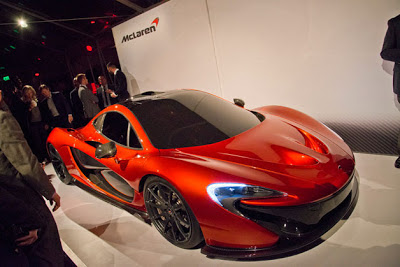McLaren invited us to private showing of its near production-ready P1 supercar in Beverly Hills last night, offering its affluent customers a sneak peek at what promises to be one of the finest - if not the best - sports car in the world when it arrives later this year. While the development team continues to hold many of the coupe's cards close to its chest, a trickle of details emerged that only served to further whet our appetite for the upcoming exotic.
- The Volcano Orange prototype (the same one shown at the Paris Motor Show) is fully functional, with a complete operating powertrain. Before each public display, a dark tint is applied to the windows to hide the interior from view.
- The chassis utilizes a carbon-fiber passenger tub shared with the MP4-12C, with aluminum structures front and rear for crash protection (carbon fiber is lighter, but it doesn't crush and absorb energy as well). All body panels are carbon-fiber and nearly all exposed metal (including the mesh vents) is made of titanium alloy. The target curb weight is 1,300 kilograms, or less than 2,900 pounds.
- Based on a recorded engine soundtrack played at the event, and noting a pair of intakes each likely feeding a turbocharger (we spotted genuine gold foil in the engine bay to help to ward off heat), it is assumed that the P1 will be fitted with a high-output version of the MP4-12C's twin-turbocharged 3.8-liter V8 making about 800 horsepower. A KERS (Kinetic Energy Recovery System), similar to what is used in Formula One, will provide a strong boost of even more horsepower for short periods. While McLaren has avoided all-wheel drive, don't rule out some sort of electric propulsion on the front axle.
- McLaren doesn't have the Porsche 918 Spyder in its crosshairs – it's too heavy and slow. Instead, it is aiming its sights directly at the upcoming Ferrari F150. That said, the British automaker expects its P1 to be the world's quickest production vehicle around Nürburgring.
- Assembly should start within the next several months. Only 500 copies will be made, with each costing about $1.2 million.
















0 nhận xét:
Post a Comment